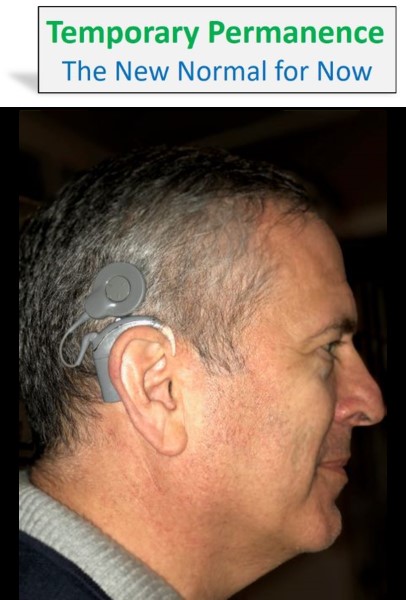The Paradox of Temporary Permanence
My Cochlear Implant Journey
Von Jay R. Weiser

A few months ago, I wrote on the paradox of Temporary Permanence (https://bit.ly/2T8QKgf). I discussed that given the pace of change, there is no “true” permanence. Temporary Permanence is the “new normal” of the world we live in. It gives a respite and a “sense of stability” when real permanence no longer exists. To survive and thrive now, we must embrace Temporary Permanence and shift our thinking about change. We must recognize/realize it sooner, understand it, and learn how to quickly learn and adapt to it over and over. Since I wrote the post, I have and will be experiencing this first-hand. Here is my story.
Many of you know that I have two cochlear implants (CI). I had surgery to replace one of them in early December. For 3 weeks, I had absolute silence on one side until I received my processor (the part you see on me in the picture) and it was activated (programmed) for the first time. It was at that moment that I began a new journey into the world of Temporary Permanence in a very big way.
Stated simply, CIs are complex biomedical devices that help those who are severely hearing impaired (and not helped by hearing aids) “hear” again. However, it is not really hearing as most people experience it. The CI processor has 2 microphones that take in sound and converts it to electrical impulses. Each impulse is sent to the implant under your skin through a wire to one of the 24 electrodes that sit in your cochlear, in under a millisecond. The brain learns to perceive these impulses and interpret and understand them as words or other sounds (car horn, soda fizz, bell, etc.). While difficult at first, the process dramatically improves and users learn more and more leading to better acuity and understanding over time, even years later as new sounds are “heard.”
Each implant is programmed differently for each person and even each ear. A user’s right processor will not work on their left ear and vice versa. This variation is based on a variety of factors. Even though the left and right ear are programmed differently, the brain learns to integrate them together, so they work in harmony (no pun intended). Keep in mind though, every time a CI is programmed the individual's perception of sound changes and they have a “new normal”, which is temporarily permanent until CI is reprogrammed.
Now back to me. When I was first activated everything, and I mean everything, sounded different – my son, my wife, my car, even the squeak in our upstairs hall. Given it is a new implant, it is impossible to go back to what my “old” normal was, nor would it necessarily be better. Now, it is a matter of me adjusting to, understanding, and getting comfortable with what I am “hearing,” and (re)learning how different people and things sound and understanding what they are saying and what these sounds are. While difficult and frustrating at times, it beats the alternative (no hearing) by a mile.
I, just like many other people faced with change and disruption, worry, get rattled, distracted, frustrated, and so on. I sometimes wish there was a permanent, reliable and true normal (like 20/20 vision), but there isn’t and won’t be. For now, I “hear” some words and think they are one thing (with near 100% certainty) only to find out that I was wrong (but hopefully at least close). The same things happen in the workplace, as some people realize that what used to work before, often does not now. Context helps understanding, for example even though cup and cut may sound the same, the brain may hear “cut of coffee” but it corrects to “cup of coffee.” As I and my brain learn, these “mistakes” will happen less frequently and what is now difficult and strange will again be easy and familiar.
That is until my next programming session on this coming Monday (3 days away). Then the cycle starts again (in varying degrees). I have, like many others, learned to adapt to the new reality of temporary permanence and learned/built the capabilities to still be successful in the face of near-constant change and disruption. If I did not, I’d have a big problem. My world is like yours, just different. Although, isn’t that the truth for everyone?
So, here are a few questions to spur your thinking and that of others on your team.
- Are you increasing your awareness and understanding of what is happening around you in your life, your work, and your environment?
- Are you continuously learning so you can become and stay ready, prepared, and able to act and adapt (whatever the change)?
- Are you doing enough to be and stay successful in a world of temporary permanence? If not, what else might you try?
If you cannot comfortably answer these questions, are not satisfied with your answers, or just want to learn more about what this means for you and your company and how to adapt, or if you want to learn more about cochlear implants, email me at
Jay R. Weiser